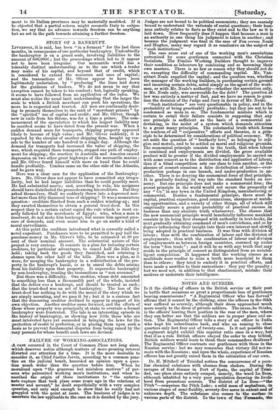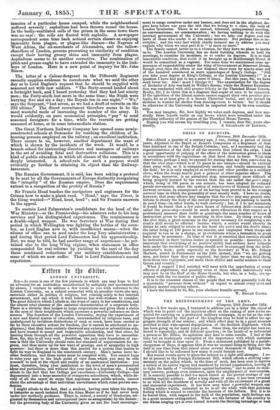NOTES AND QUERIES.
Is it the clothing of officers in the British service or their post in battle that occasions so great a proportionate loss of gentlemen bearing commissions P "A Regimental Officer who has Served" affirms that it cannot be the clothing, since the officers in the Sikh war suffered as severely, although their dress approached much more nearly to the dress of private soldiers. The cause, he thinks, is the officers' leaving their position in the rear of the -men, where they can better see that the -soldiers are in proper place and ac- tion. The Regimental Officer tells a story of an offieer in India who kept his subordinates back, and who on coming to close quarters only lost four out of twenty-one. Is it not possible that a regiment might exhibit this superior ratio once in a way, but that if as a rule British officers obeyed the order to stop behind, British soldiers would learn to think their commanders skulkers? The Regimental Officer contrasts our gentlemen with those in the Russian service : but we may remember that -victory did not re- main with the Russians; and upon the whole, experience of Russian officers has not greatly raised them in the estimation of our own.
Dr. H. Mitchell of Trinidad notices the concurrence of a pecu- liar chemical substance with absence from cholera. During the ravages of that disease in Port of Spain the capital of Trini- dad, one place alone entirely escaped, namely, the ward La Brea, although inhabited by a very poor population drawing its liveli- hood from precarious sources. The district of La Brea—" the Pitek"—comprises the Pitch Lake; a solid mass of asphaltum, in 'various stages of semi-fluidity, seventy-five acres in extent and of unknown depth. The substance also comes to the surface in various parts of the district. In the town of San Fernando, the
inmates of a particular house escaped, while the neighbourhood suffered severely : asphaltum had been thrown round the house. In the badly-ventilated cells of the prison in the same town there was no case: the cells are floored with asphalte. A newspaper correspondent some time back noticed certain classes as enjoying immunity from plague, or plague-like disease—the Negroes of West Africa the oil-merchants of Alexandria, and the tallow- ohandlers of London, persons presenting no similarity of condition except their having greasy skins and immunity from plague. Asphaltum seems to be another corrective. The combination of pitch and grease ought to have extended the immunity to the link- boys of London. Here is a new point of inquiry for Mr. Sohn Simon.
The letter of a Colour-Sergeant in the Fifteenth Regiment casually supplies evidence to corroborate what we -said the other day as to Lord Raglan's request that he should be supplied with seasoned not with raw soldiers. "The Sixty-second landed about a fortnight back, and I heard yesterday that they had lost ninety men; the Forty-sixth lost more in the same time ; the Ninth were burying five and six a day ; -the Royals ten in one night." " We," says the Sergeant, "lost seven, as we had a draft of recruits on the 22d ultimo." The direct recruitment therefore seems to be the most wasteful mode of increasing the number of the army. It would evidently, on pure economical principles, " pay " to send seasoned foreigners for a time, while the recruits are getting seasoned at home, or in some intermediate station.
The Great Northern Railway Company has opened some newly- constructed schools at Doncaster for teaching the children of la- bouring persons employed on the railway ; an excellent institution. There occurs to us, however, another department the want of which is shown by the incidents of the week. It would be a branch school for instructing directors and managers of railways in the art of avoiding fatal and destructive collisions. This is a kind of public education in which all classes of the community are deeply interested. A school-rate for such a purpose would evidently go further to attaining its object than the Railway- insurance.
The Russian Government, it is said, has been asking a protocol to be sent by all the Governments of Europe distinctly,reeognizing the " integrity " of the Russian empire. Does the requirement extend to a recognition of the probity of Russia ?
Sir Francis Head teaches the navigators and engineers for the Crimea how to make a plank road. "Head," says the Times, is the thing wanted—" Head, head, head" ; and Sir Francis answers to the appeal.
To sustain Lord Palmerston's candidature for the head of the War Ministry—or the Premiership—his admirers refer to his long services and his distinguished experiences. The reminiscence is a double-edged weapon. He was Secretary at War during that period in which Wellington was fighting the battles of the coun- try, as Lord Raglan now is, with insufficient means—when the abuses of office ran to seed under the long Tory administration ; and during that period Lord Palmerston had his apprenticeship. But, we may be told, he had another range of experience—he per- tained also to the long Whig regime, when statesmen in office compounded for real reforms by yielding to the cant of the day those continued reductions of our military establishments for some of which we now suffer. That is Lord Palmerston's second experience.







































 Previous page
Previous page